Content
- 1 Description and taste of turkey meat
- 2 The chemical composition of turkey
- 3 Nutritional value and calorie content of turkey meat
- 4 Why is turkey meat useful?
- 5 Is turkey possible for pregnant and lactating
- 6 Is turkey good for weight loss?
- 7 Daily intake
- 8 Turkey in cooking
- 9 The benefits and harms of turkey broth
- 10 Why is turkey fat useful?
- 11 Turkey harm and contraindications
- 12 Which is healthier: chicken or turkey
- 13 How to choose the right turkey
- 14 How to store a turkey at home
- 15 Conclusion
- 16 Reviews
Recently, turkey has begun to gain popularity outside the American homeland and is now increasingly appearing on the tables of culinary specialists in Europe, and in the industrial poultry industry it is the second most important bird after chicken due to the exceptional properties of its meat. You can now find a turkey in almost any store, and therefore it will be useful to figure out what the benefits and harms of this product are.
Description and taste of turkey meat
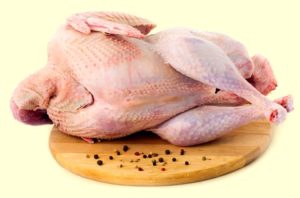
Turkey has tender lean meat, which is actively used in dietary nutrition and is a source of many beneficial properties. Its color varies from creamy pink to intense red. The taste of meat depends on the conditions in which the birds were raised and what they ate. Unlike chickens, which can be kept even in tight spaces, turkeys need free grazing and fresh air for normal development. They are more in need of a varied diet, since they cannot live on one compound feed. This is another reason why the meat of these birds is considered more natural and healthy.
As in the case of chicken, turkey meat is divided into dark and white. Breast is considered white meat. It tastes drier when compared to other parts of the bird. Turkey breast is less nutritious and therefore generally considered to provide more benefits. Dark meat is more fatty and juicy, it tastes like game. It is softer than white and its aroma is more intense.
Both white and dark turkey meat are highly prized in cooking. There are many recipes that use different parts of this bird, so everyone can find a dish to their liking based on their preferences.
The chemical composition of turkey
Nutritionists around the world note the tremendous benefits of turkey meat, since it contains a large amount of various vitamins and minerals necessary for the health of the body. So, turkey meat includes:
- selenium;
- phosphorus;
- iron;
- zinc;
- magnesium;
- sodium;
- potassium;
- essential amino acids;
- B vitamins;
- vitamins R, PP, E.
Turkey meat has 2 times the concentration of iron and sodium in comparison with beef, and very little fat and bad cholesterol, which makes the benefits of this product undeniable in the diet of a dieter. And in terms of the content of no less useful selenium and phosphorus, turkey meat is not inferior to any fish.
Dark meat, such as turkey drumstick and thigh, is believed to be less beneficial than white meat. However, this is not quite true. According to recent research, dark meats are higher in selenium and zinc. The same goes for B vitamins and iron.In turn, white meat contains more protein and less cholesterol.
Nutritional value and calorie content of turkey meat
Turkey is a low-calorie product. 100 g of this poultry meat contains from 160 to 190 kcal. It has no carbohydrates at all, and most of the calories in turkey meat are protein and fat. Below are the nutritional data for turkey, including the chemical differences between white and dark meats.
|
|
White meat, 100 g |
Dark meat, 100 g |
|
Calorie content |
161 kcal |
192 kcal |
|
Fats |
4 g |
8 g |
|
Protein |
30 g |
28 g |
|
Iron |
1.57 mg |
2.4 mg |
|
Zinc |
2.08 mg |
4.3 mg |
|
Vitamin B1 |
0,4 mg |
0.5 mg |
|
Vitamin B2 |
13 mg |
24 mg |
|
Selenium |
32.1 μg |
40.9 mcg |
|
Vitamin B9 |
1 μg |
10 mcg |
Why is turkey meat useful?
As you can see from the composition, turkey meat has a lot of useful properties. It is not for nothing that doctors recommend including it in the diet for people of almost all age groups, regardless of health status, especially for athletes and those who are losing weight, as well as people who are in the process of recovering from operations.
For adult women and men
As noted above, turkey meat is a rich source of vitamins. It contains especially a lot of vitamin PP, which regulates redox processes, normalizes digestion and helps to eliminate toxins from the body.
Useful amino acids found in turkey, along with potassium and magnesium, are actively involved in the functioning of the nervous and cardiovascular systems.
And phosphorus has a beneficial effect on the condition of bones and teeth.
Vitamins of group B, in turn, help food to be better absorbed. Together with iron, they ensure the normal course of hematopoietic processes and prevent the occurrence of anemia.

A turkey is of great benefit to a woman's body. In particular, vitamin E, which is part of turkey meat, not only gives elasticity to the walls of blood vessels, but also has a positive effect on the female reproductive system. The presence of a sufficient amount of this vitamin makes nails strong and beautiful, and gives hair a healthy shine. Vitamin E also helps maintain skin elasticity and protects it from external influences, which allows women to stay young and beautiful longer.
For men, the benefits of turkey are high levels of selenium and zinc. Selenium strengthens the immune system, slows down the aging of the body. It reduces the risk of cancerous tumors and ensures the normal functioning of the endocrine glands. Selenium also contributes to the production of the sex hormone testosterone, which affects the functioning of the male reproductive system.
For children
Since turkey meat, unlike chicken meat, is hypoallergenic, it can be eaten even by young children. Due to its beneficial properties, turkey meat will be an ideal option for a child's first meat feed. Turkey meat contains calcium and potassium, which are necessary for the growth and formation of the musculoskeletal system, and vitamin B12 stabilizes the nervous system and normalizes sleep.
For bottle-fed children, it is recommended to introduce turkey meat in the form of mashed potatoes from about 6 to 7 months, and for infants from 8 to 9 months. This should be done only after consulting a pediatrician.
At first, the meat puree should be given to the child at the tip of a teaspoon. Wait at least 24 hours before feeding the turkey again to eliminate the risk of individual intolerance. If no allergies are identified, you can gradually increase the serving size. 9-month-old children can be given 20-40 g of turkey puree per day, 10-month-olds - already 40-50 g. At 12 months, the serving size should reach 70 g per day.
For athletes
Physically active people also note the benefits of turkey meat.It is rich in protein, which helps increase muscle mass, as well as amino acids, which speed up metabolism. In addition, turkey is very nutritious and digestible better than any other meat. It is perfect for replenishing energy reserves after a grueling workout.
Is turkey possible for pregnant and lactating
Turkey dishes can be safely consumed by women while breastfeeding and during pregnancy, since turkey meat is considered one of the few types of meat that does not harm the baby. It does not cause allergies, and a wide range of vitamins and minerals in its composition will be equally beneficial for both mother and baby. So, choline and phosphorus stimulate the brain activity of the baby, and the high sodium content strengthens the mother's nervous system, which is especially important for a woman during postpartum stress.
It is worth incorporating turkey into her diet for a nursing mother gradually, starting with one small piece. It is best to boil the meat or steam it. Then you should pay attention to the baby after feeding. If the baby has no allergic reactions and no digestive upset, it means that his body has accepted the new product well and the portion can be increased to 100 - 150 g.
If your child has skin irritations or any signs of gastrointestinal problems, you should immediately limit the use of turkey. After a few weeks, when the baby's stomach is more comfortable, you can try to reintroduce meat on the menu.
Is turkey good for weight loss?
For weight watchers, turkey will also be very beneficial, as it effectively satisfies hunger and gives a feeling of fullness for a long time. Its low calorie content will be appreciated by everyone who wants to lose weight. Turkey breast, which is very low in fat, is especially beneficial in this regard.
Turkey breast contains a lot of choline. It actively participates in the breakdown of fats and regulates blood sugar levels, thereby improving metabolism and accelerating the process of losing weight.
Daily intake
The benefits of eating turkey, like any other product, can be harmful to health, so it is important not to get carried away and not exceed the norms for its use. A turkey contains about half the daily protein requirement for an adult. Protein is vital for the normal functioning of the body, but too much protein can have negative health effects. Therefore, it is worth limiting the amount of turkey meat to 100 - 130 g per day.

Children from 1 to 3 years old are recommended to consume 50 - 70 g of meat per day. In this case, it is necessary to alternate meat dishes with products from other food groups.
Turkey in cooking
Due to its delicate and neutral taste, turkey goes well with completely different products and even other meats, so it is used in a large number of dishes. Almost all parts of a poultry carcass are edible. Even a turkey neck can be used to make a delicious stew or a rich soup that will do as much good as a fillet or breast.
Turkey meat can be stewed, marinated, fried, smoked, stuffed, marinated and steamed. But boiled and baked turkey has the greatest benefits.
How much and how to cook turkey
The cooking time of the turkey may vary depending on the part of the bird's body and the dish it is being used for. It will take 2 to 3 hours to cook a whole carcass in a saucepan, while individual pieces of poultry and fillets will be ready in 30 to 40 minutes. If you cook a turkey in a slow cooker, the cooking time is significantly reduced - to 45 and 20 minutes, respectively.
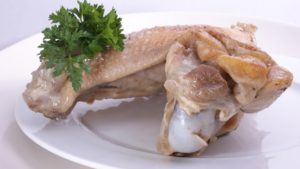
Rinse turkey meat thoroughly before cooking. The turkey will retain its properties and will be more juicy if poured over with boiling water. Add a little milk to the cooking water - this will make the meat more tender. To make boiled turkey meat tasty and soft, you should pay attention to the following recommendations:
- It is advisable to remove fat and skin from fresh meat; frozen turkey must be defrosted before cooking.
- To prepare the soup, the turkey is boiled in cold water, for the second courses it is dipped in boiling water.
- The taste properties of boiled turkey will be well emphasized by onions cut into small cubes.
- First, the turkey is boiled in an open pan, which must be covered with a lid towards the end of cooking. In this case, the broth will turn out to be rich, and the meat will be juicy.
- If foam forms during cooking, it must be removed from the broth in a timely manner.
- For the first 20 minutes, the turkey should be cooked over high heat, reducing it as it cooks.
- The meat must be completely hidden under water. The evaporated water is topped up if necessary.
- At the end of cooking, let the meat simmer in the broth for about 15 minutes.
Despite the fact that turkey contains enough sodium, you should still lightly salt the water before boiling to preserve the beneficial properties of the meat.
How to roast a turkey
The roasting time of the turkey also depends on which part of the bird you plan to cook. To do this, you can use a regular frying pan. The turkey steaks are cooked quite quickly, for 20 minutes over moderate heat - 10 minutes on each side. Shin preparation takes longer - 35 minutes. The wings take a long time to reach readiness due to their large size. This usually takes 40 to 45 minutes.
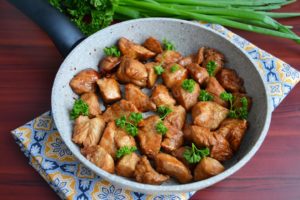
Those who love to cook effortlessly and with maximum benefit will love the roasted turkey fillet:
- The turkey fillet is cut into 3 - 4 cm pieces.
- Then the meat is spread in a preheated pan with vegetable oil.
- Salt and other spices are added to taste.
- Fry the fillets for 10 - 15 minutes, stirring regularly, so that the meat is evenly fried.
- At the end of cooking, the meat is left to simmer under the lid for 3 to 4 minutes.
Before frying, you can leave the turkey in a sauce or marinade for 15 minutes to make the meat taste more piquant.
How to marinate and bake a turkey
The favorite way to cook turkey is baking it in the oven. Most often, a whole bird is prepared in this way. There are several nuances for making a delicious baked turkey:
- Before baking, thawed or fresh turkey should be left for 1 hour at room temperature: this will allow the meat to warm up faster in the oven and retain its juiciness;
- Poultry is cooked at 180 ° C in natural form or in foil. In the latter case, holes are made in the foil to allow steam to escape.
- 30 minutes before cooking, the foil is removed so that the meat is properly browned.
- For a nice crispy crust, you can water the meat juice every 30 minutes.
- Readiness is checked with a meat thermometer, while it should not reach the bones. The temperature in the most meaty part of the bird should be at least 90 ° C.
- When checking for doneness with a fork or knife, it is important to pay attention to the color of the meat. It should be white, without pink streaks, and give off a clear sap.
- Once the bird is ready, take it out of the oven and leave it under foil for 30 minutes. This will make the meat denser, making it easier to cut.
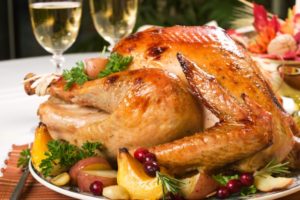
The cooking time increases according to the size of the bird. So, a carcass weighing 4 kg will be baked for 2.5 hours, and a 6-kilogram carcass - 3.5 hours. Time is calculated using the following formula: 20 minutes for every 450 g of meat. When cooking a stuffed turkey, consider the weight of the side dish.
Before baking, do not grease the meat with mayonnaise, vegetable oil or sour cream. In this form, the turkey will only burn on the outside and poorly baked on the inside. It is best to rub the poultry with lemon juice mixed with spices such as rosemary and leave it that way for a couple of hours to soak the meat well.
Alternatively, marinate the turkey. For the marinade, wine, wine vinegar, champagne or cognac with the addition of spices, honey, garlic or lemon are usually used. The turkey is soaked in it for 12 to 18 hours, sometimes longer. And although this process takes a lot of time, the taste of the finished dish will definitely be worth the effort.
What turkey is combined with
It is best to serve turkey dishes with vegetables, which greatly enhance the taste of this meat. Vegetables can be different, cooked in any way; optional - even raw. Cereals and pasta go well with turkey. Fried mushrooms will be an excellent side dish for poultry.
Turkey meat also retains its wonderful taste when cooled. So, a sandwich with a cold turkey for breakfast will not only benefit the body, but also give a boost of vigor for the whole morning. Cold meats are also a great ingredient in a salad or roll.
The benefits and harms of turkey broth
If everything is pretty straightforward with turkey meat, then there are still debates about the benefits and harms of turkey broth for the body. During the cooking process, any meat, including turkey meat, releases harmful substances into the water that enter the animal's body with food. Unfortunately, today this is inevitable, since not all feed that poultry and livestock receive on farms is environmentally friendly. Therefore, the richer the broth, the more harmful it is considered.
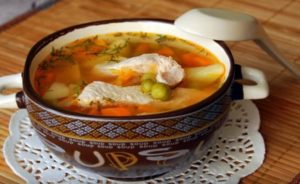
In addition, the very liquid broth is quickly absorbed by the body and does not stay in the liver, which filters out harmful toxins and poisons. Unwanted substances get into other organs of the digestive tract and can have a negative effect on them.
But still, the harm of the broth is exaggerated and there are much more useful properties in it. Turkey broth is indispensable in cases where the human digestive system does not process other food. It is recommended for people in the postoperative period to quickly replenish vitamin and energy resources.
Turkey broth will bring minimal harm if you follow the rules for its preparation:
- In the process of boiling bones or meat, drain all the water 5 to 10 minutes after boiling.
- This procedure is repeated twice.
- The third time, the turkey continues to cook for another 1.5 hours over low heat.
This broth will be less rich, but more useful.
Why is turkey fat useful?
Most dietitians agree that turkey fat is more beneficial and less harmful to humans than other types of animal fat. It contains the least amount of bad cholesterol and is also rich in vitamin E, which makes it a valuable ingredient not only in cooking, but also in cosmetology.
Turkey fat is used in the preparation of side dishes and salads as a vitamin dressing, it is used as deep fat for frying meat and vegetable products. It can also be found in face and body creams. Turkey fat will serve as a wonderful ingredient for making cosmetic masks at home.
However, only fresh or frozen fat has beneficial properties. It is best to store it in the freezer in small portions.
Turkey harm and contraindications
Of the whole range of meat products, turkey can be called the least harmful. But, despite all the useful properties of turkey meat, there are still a number of contraindications for the use of this poultry meat for food.
Limiting the amount of turkey in the diet is worth people suffering from:
- individual intolerance to this meat;
- kidney disease;
- gout;
- urolithiasis.
However, turkey, like any other meat, can do a lot of harm to healthy people if it is eaten in unlimited quantities. To reduce the risk of harmful effects, it is worth observing the measure in the use of turkey meat.
Which is healthier: chicken or turkey
Chicken, like turkey, is considered a dietary food and is a favorite food of people who want to lose weight. But for all its popularity, chicken loses to turkey in terms of useful properties. Chicken meat contains almost the same amount of protein, but much less selenium, sodium and iron. It is also considered a strong allergen, unlike turkey, which does not cause allergic reactions.
Turkey tends to be less harmful because poultry turkeys are supplied with a variety of foods. Chickens are unpretentious and feed mainly on compound feed, which affects the quality of meat. Certain unscrupulous poultry farmers often feed chickens with growth stimulants and chemical additives that can harm the human body, even if the meat has been thermally processed. Turkeys, on the other hand, do not tolerate chemicals in food very well, so a minimum of harmful substances is used when growing them. Therefore, turkey meat is healthier than chicken meat.
However, you shouldn't give up chicken entirely. In addition to its excellent taste, it contains Omega-3 and Omega-6 acids, which are very few in turkey meat. If you choose the right chicken, it will do just as good as a turkey.
How to choose the right turkey
Today, turkey can be purchased raw or frozen at almost any major store. Moreover, on sale you can find both whole carcasses of birds, and their various parts, minced turkey, offal and fillets. But in order for turkey meat to turn out delicious and bring not harm, but benefit, you need to learn how to choose it correctly.
- When choosing whole poultry, you should give preference to large meaty carcasses. It is better to purchase a young bird with smooth legs and a light comb: its meat is more tender and juicy.
- The skin of the turkey should be light and uniform, without blotches, a slight yellowish tint. The bird's eyes should be clear and shiny, and the beak should be dry.
- It is advisable to touch the carcass with your finger. When you press on the meat, the hole that appears should quickly disappear. If it remains and liquid has accumulated in it, this is a sure sign that the meat is stale.
- You should also not take a bird with slippery and sticky skin.
- The meat should be free of foreign odors.
- When choosing turkey fillets, you should pay attention to the fact that the packaging is intact.
- When buying frozen turkey, it's important to always check the expiration date of the product.
Although turkey can be found on shelves at any time of the year, fresh meat is best bought during the pre-New Year period - from the second half of October to December.
How to store a turkey at home
Fresh turkey meat, along with other meat, can be stored in the refrigerator without problems if you remove excess moisture from the surface of the carcass and wrap it in a plastic bag. The shelf life may vary depending on temperature and humidity. Typically, a turkey is consumed within 1 to 2 days after purchase. With longer storage, it begins to lose its beneficial properties and deteriorates quickly. After 2 days, the turkey should be frozen. Home-frozen turkey meat does not last as long as store bought.
Purchased frozen turkey is suitable for consumption within 1 year if all storage conditions are followed. When defrosting, harmful microorganisms multiply in meat, so it should be cooked immediately.You can not re-freeze the product: there are practically no nutrients left in such meat and it will harm the body.
Conclusion
Having studied all the properties of turkey, it can be noted that it has tremendous benefits for people of almost all ages, and its harm is minimal. The main thing is to comply with the consumption rate and choose high-quality meat, then the result will be a dish that can please any connoisseur of healthy and tasty food.

